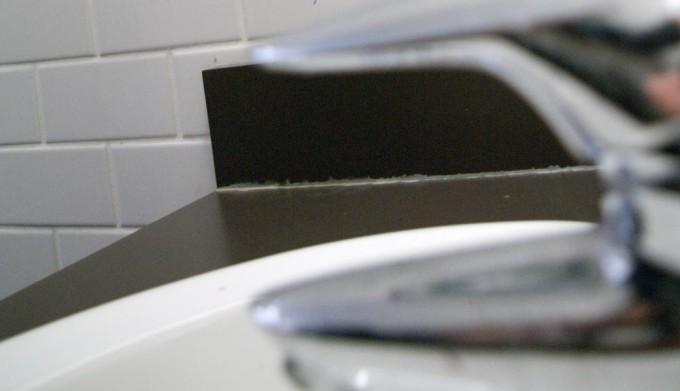By Nadya Domingo
Ryerson’s Student Campus Centre (SCC) is renovating their thirdfloor washrooms to accommodate Muslim student ablutions.
The renovations include creating an ablution-friendly bathroom equipped with footbaths and sinks. The bathrooms are set to open next week.
An ablution is a mandatory act of washing oneself before prayer, including ones hands, feet, face, and parts of the head. This ritual must occur in order for prayer to be completed properly.
Fairuz Schickh, a Muslim Student Association (MSA) member at Ryerson, said she prefers performing ablutions in mosques close to school. The second-year psychology student said that ablutions can be messy when performed in an area that isn’t built specifically for the ritual.
Schickh avoids the washrooms at Ryerson because they don’t provide sufficient space to perform ablutions.
“We don’t want to cause chaos and mess,” said Schickh. The washrooms on the third floor of Oakham House have been renovated to provide more space for ablutions.
The handicap stalls in both the men’s and women’s washrooms have been removed to make space for the stations. A new, single-stall handicap washroom has been built between the men’s and women’s washroom. The bathroom, which was once empty office space, can be accessed from the hallway.
Caitlin Smith, president of the Ryerson Students’ Union (RSU), said that because the handicap stalls were not located in a hightraffic area, the move shouldn’t pose problems.
“It’s not that we’ve taken away accessible washrooms,” she said. “We hadn’t heard any concerns before.”
The renovated men’s and women’s washrooms will include footbath and hand sink combinations, so students can stand while washing themselves instead of sitting.
New high-speed dryers have been built below the footbaths aswell.
Eric Newstadt, general manager of the SCC, said he recognized that people needed a specially designed space to perform the ritual.
“Students would wait or perform ablutions in other sinks,” he said. “That was creating some issues in usability and space.”
If students weren’t waiting in line to do their ablutions, they were using standard sinks instead to wash themselves.
This posed problems for the maintenance of the bathroom as water would overflow from the sinks. Shickh says that the new ablution stations are a great idea because they are more comfortable in their set-up.
“It shows that people are actually putting in the effort to bring [ablution stations] and that Muslim students have a place to go on campus,” she said.
This isn’t the first time ablutions have been considered in Canadian university washrooms. The University of British Columbia (UBC) has renovated their bathrooms not only for religious purposes, but to also provide a safe and comfortable bathroom that is gender inclusive.
The Muslim students at UBC would use the washrooms up to five times a day for ablutions, noting that the task included hopping on one foot to reach the other into a sink. In the meantime, signs have been posted in the bathrooms informing students not to do ablutions.













Jenny
I think it’s great that this article is acknowledge this addition to the students center. It would be even more great if the language was also progressive. Handicapped is a dated term, it is offensive, and inappropriate in any context.